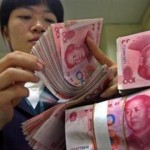Will China Float its Currency?
As Marcy Nicks Moody pointed out in her article, “A Dusty Springfield Approach to the Chinese Exchange Rate,” the Treasury Department was to release its report on international economic and exchange rate policies on April 15. But last week, Treasury Secretary Tim Geithner announced that he would delay the release of the report noting that key meetings with world leaders in the upcoming months necessitated the delay. Many saw this as a sign that the U.S. was in dialogue with the Chinese about the exchange rate with the real possibility that China would give its currency some freedom.
But in today’s New York Times, Michael Wines reports that perhaps we shouldn’t be so sure. Domestic fiscal and monetary policy issues are pushing Chinese leaders not to float the yuan, Chinese currency (a.k.a. the renminbi or RMB). Interestingly, the online version of this article has the title “China’s Recovery Keeps Focus on Interest Rates and Currency” while the title in today’s paper version is the more explosive “China Move on Currency Not at Hand.”
So will China succumb to foreign pressure or will it remain focused on its own recovery and not look to change its currency policy just yet? You decide. Take our poll on this issue listed on the left hand side of the website. Results will be posted next Friday, April 23.
 On Facebook
On Facebook By Email
By Email 

I vote yes, and I will bet on wheat and soy-bean:
As a result of floating the currency in China, the purchasing power of 1/3 of the world’s population will suddenly jump, consequently they will start to demand more food.
If you cannot accept this, at least make sure to pick up two more package of pasta, when you went for grocery shopping next time. lol
I voted yes, but not because of foreign pressure so much as worries about domestic inflation. Pegging the yuan low to the dollar benefited the Chinese economy during the global recession, but now that the world is recovering, China is in danger of experiencing high inflation. I think they will want to let the yuan rise slowly so that it will not severely negatively impact exports while preventing sharp inflation.